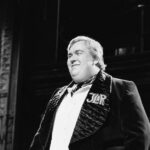John Okafor, widely and affectionately known as Mr Ibu, was more than just a Nollywood actor; he was a comedic institution whose impact reverberated across Africa. His unique brand of humor, often physical and expressive, transcended language barriers and cultural differences, making him a beloved figure throughout the continent. Mr Ibu’s passing at the age of 62 has plunged Nollywood, his family, and countless fans into mourning, but his legacy as a man who brought unparalleled laughter to millions remains firmly etched in entertainment history.
Mr Ibu’s comedic genius was so profound that he could elicit laughter without uttering a single word. His mastery of facial expressions and body language became his signature, setting him apart in the bustling world of Nigerian comedy. As he once humorously recalled, simply appearing on set in a doctor’s costume was enough to send the entire crew into fits of laughter, highlighting his innate comedic presence. This natural ability to connect with audiences on a non-verbal level was a cornerstone of his enduring appeal.
The Rise of Mr Ibu: A Nollywood Phenomenon
John Okafor’s breakthrough moment arrived in 2004 with the film that bore his now-iconic moniker, “Mr Ibu.” This movie introduced audiences to the character of Mr Ibu, a single father navigating life’s absurdities with his son, stumbling through a series of hilarious and often chaotic situations. The film’s success was immediate and widespread, catapulting Okafor into national and continental stardom.
Film director Babangida Bangis aptly described Mr Ibu’s comedic strength, noting, “His facial expressions and his body were his biggest selling points.” This contrasted sharply with many comedians who relied heavily on dialogue. Bangis drew a comparison to the legendary Rowan Atkinson, stating, “Mr Ibu was different as he doesn’t even have to talk to elicit laughter, as his face just like Mr Bean will do the trick.” This ability to communicate humor through physicality alone solidified his place as a unique comedic force.
One scene, in particular, became synonymous with Mr Ibu and served as his introduction to a wider African audience. In “Mr Ibu,” he and his son are depicted returning from farm work with a single bicycle. The scene unfolds with a simple premise: father and son, one bicycle, and the judgmental eyes of passersby. Initially, the father allows his son to ride, leading to accusations of disrespect towards his elder. They switch places, and now the father is deemed wicked for making his young son walk. Ultimately, they both walk, only to be labeled senseless for not using the bicycle at all. This scene, rich in situational comedy and relatable human absurdity, became instantly iconic and underscored Mr Ibu’s talent for physical comedy and comedic timing. The phenomenal success of “Mr Ibu” spawned four sequels, and John Okafor became inextricably linked to the character, forever known as Mr Ibu.
Bridging Nollywood and Kannywood: A Unifying Figure
Mr Ibu’s influence extended beyond the borders of Nollywood, reaching into the Hausa-language film industry of northern Nigeria, known as Kannywood. This crossover was significant, as Kannywood was often perceived as distinct and separate from the southern-based Nollywood. John Okafor was among the pioneering Nollywood figures who ventured north, fostering collaboration and unity between the two industries.
His most notable Kannywood project was the comedy “Hajiya Babba,” a Hausa-language film that told the story of two brothers from southern Nigeria who reconnect with their father in the north and embark on a new chapter of their lives. Babangida Bangis emphasized Mr Ibu’s role in cultural bridge-building, stating, “He was one of those who helped bridge the gap and bring unity between Kannywood and Nollywood by going to the north to act.” This willingness to cross industry lines highlighted his commitment to Nigerian cinema as a whole and his desire to connect with diverse audiences.
Born on October 17, 1961, John Okafor hailed from Enugu state in southeastern Nigeria, a region renowned for producing numerous Nollywood stars. His early life was marked by hardship. He moved to live with his brother and took on various menial jobs to support himself and his family. From hairdressing to photography, Okafor explored different avenues before finding his true calling in acting. His entry into Nollywood was serendipitous. During a film audition, the legendary actor Pete Edochie recognized Okafor’s raw talent and opened the doors of Nollywood, launching his remarkable career.
Tributes and Reflections: Remembering Mr Ibu’s Legacy
The news of John Okafor’s passing triggered an outpouring of tributes from colleagues, fans, and prominent figures across Nigeria and beyond. Comedian Bovi hailed Mr Ibu as “one of the greats,” acknowledging his immense contribution to Nigerian entertainment and expressing solace in the enduring nature of his work. Nigeria’s Culture Minister, Hannatu Musawa, recognized him as a “household name” who brought joy to families throughout his career.
Mr Ibu’s health challenges became public in the previous year, culminating in the amputation of one of his legs in November after a public fundraising effort to cover his medical expenses. While it is believed he suffered from diabetes, the official cause of death has not been disclosed by his family. Despite bringing laughter to countless people, Mr Ibu’s personal life was marked by turbulence. He was married multiple times, with many of these unions ending in divorce. He poignantly described his fifth marriage as his “worst,” reflecting on the personal struggles he faced despite his public persona as a source of joy. “This is my final marriage. If this one falls apart, I won’t marry again. This is my fifth and the worst marriage,” he revealed in an interview, offering a glimpse into his private life.
Reports indicate that Mr Ibu is survived by 13 children, some of whom have been involved in controversies. Following the donations for his medical treatment, his son Daniel Okafor and adopted daughter Jasmine Chioma were arrested on suspicion of misappropriating a significant portion of the funds. These allegations, which they denied, added a layer of complexity to the narrative surrounding his final months.
Although he had not appeared in new films recently, Mr Ibu remained active until his health declined. In October 2020, he ventured into music, releasing two singles, “This Girl” and “Do You Know.” However, his musical foray did not achieve the same level of success as his acting career. Ultimately, John Okafor’s enduring legacy will be as Mr Ibu, the comedic icon who brought laughter into homes across Africa. Fan Aminu Hamisu’s plan to honor Mr Ibu by revisiting his classic movies on YouTube is a sentiment shared by many. His films are expected to be revisited and celebrated by fans for years to come, ensuring that the laughter he generated continues to resonate.
Discover More About Nollywood and Nigerian Entertainment
For further reading on Nigerian entertainment and Nollywood’s impact, explore more stories from the BBC and other reputable news sources.


